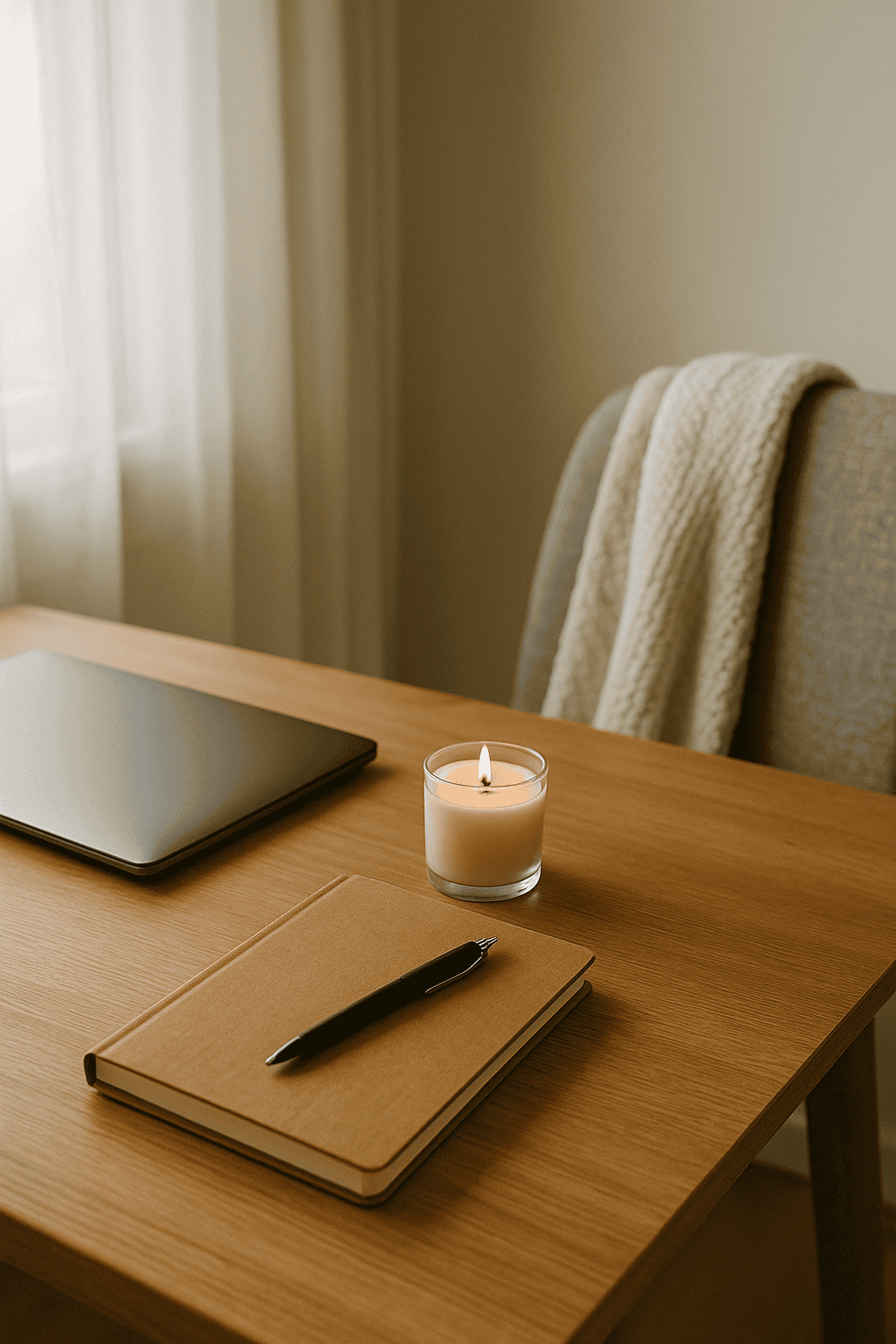Avoid Creative Burnout—5 Hacks for New Indie Authors
“You can’t depend on your eyes when your imagination is out of focus.” — Mark Twain
Burnout isn’t just for 9-to-5 jobs or CEOs. It’s a common challenge that can affect new indie authors as well. Unlike traditional careers, creative burnout doesn’t come with sick days or backup teams. It creeps in quietly. The blank page feels heavier. The edits never feel good enough. The “just one more thing” that stretches into late-night exhaustion.
If you’re a new indie author, you’re likely juggling writing, editing, marketing, social media, and possibly a day job or caregiving, too. It’s no wonder so many talented writers stall out before finishing their second book or even their first.
But creative burnout doesn’t have to be your story.
In this writer’s guide, you’ll discover how to recognize creative burnout, prevent it, and recover your creative spark without abandoning your author dream. If you’d like all the strategies in one place, read Beat Burnout: Powerful Habits for Focus, Consistency, and Indie Author Success (available in paperback and eBook).
What Exactly Is Creative Burnout?
Creative burnout is a state of emotional and mental exhaustion caused by prolonged creative effort without adequate recovery. It often shows up as:
- A loss of enthusiasm or motivation
- Chronic fatigue, even after rest
- Feeling creatively “numb” or detached from your work
- Procrastination or guilt over not writing
- An urge to quit entirely
Warning Signs You’re Headed for Burnout
You might be drifting toward creative burnout if:
- Your writing feels like a chore rather than a joy
- You’re pushing through deadlines while skipping sleep
- You say “yes” to everything (beta readers, guest blogs, social media challenges) because you feel you have to
- You beat yourself up for not writing enough, even on busy or challenging days
- Your hobbies, reading time, or social life have disappeared
5 Strategies to Prevent (or Recover from) Creative Burnout
1. Set Boundaries Around Writing Time
More hours at the desk don’t always equal better work. In fact, overworking often backfires. Instead:
- Designate specific writing hours, even if it’s just 30 minutes a day.
- Build in non-writing days weekly for rest or inspiration.
- Don’t feel guilty about turning down extra writing-related tasks.
Pro Tip: Protect your creativity like it’s a battery. Let it recharge.
2. Shift from Performance to Play
If every session feels like a sprint toward a goal, your brain never gets a break. Try:
- Writing without a word count goal once a week. Just explore.
- Starting a low-stakes side project (poems, flash fiction, journaling).
- Reconnecting with what made you want to write in the first place.
“Play is not a luxury. It’s a necessity.” — Brené Brown
3. Fuel Your Body and Mind
Burnout thrives on poor nutrition, inadequate sleep, and excessive caffeine consumption. Reverse the trend:
- Stay hydrated and eat brain-boosting foods (like leafy greens, berries, and omega-3s).
- Establish a wind-down routine to help you sleep better.
- Move your body: walk, stretch, dance, or try short bursts of exercise.
4. Refill Your Creative Well
You can’t pour from an empty cup. Fill yours with:
- Books in genres you don’t write (let your brain play)
- Nature, music, art museums, or conversations with interesting people
- Podcasts or documentaries that spark ideas, not pressure
5. Ask for Support (Yes, You’re Allowed)
Creative burnout can feel lonely, but it doesn’t have to be. Reach out to:
- Writing groups or online communities for emotional support
- A writing coach, mentor, or accountability buddy
- Tools that lighten your load (AI for brainstorming, outlining, or editing)
Common Pitfalls to Avoid
- Believing productivity = worth. You’re more than your word count.
- Comparing your pace to other writers. Their path isn’t yours.
- Ignoring your body’s signals. If you’re tired, rest. If you’re uninspired, play.
- Thinking burnout means you’re not cut out for this. You are.
Wrap-Up: You Can Write Without Burning Out
Being an indie author is a long game. The goal isn’t just to write one book. It’s to keep writing. To build a sustainable, joyful, creative life.
Burnout is a sign, not a stop. It’s a natural part of the creative process. Listen to it. Adjust. Refill. And keep going. You’re not failing. You’re learning how to navigate the challenges of a creative life.
Writing a book is a marathon, not a sprint. Your creativity is the fuel that powers you forward. Don’t let burnout steal your passion. Start using these five strategies today to protect your energy, refill your well, and build a writing life that lasts.
Want more mindset tips? Explore our complete Writing Focus & Habits series on our website. Print the free checklist (below): “Burnout-Proof Your Writing Life.”
We trust you’ve found this writer’s guide both enlightening and inspirational. They’re designed to equip you with the tools and insights to bolster your success as a burgeoning author.
The path of writing is one filled with continual learning and enhancement. You are not expected to tread this path solo. We’re thrilled to accompany you on this journey, offering support and motivation at every turn. Our objective is to deliver foundational knowledge and pragmatic guidance, enabling you to traverse the literary landscape with amplified confidence.
Explore more writer’s guides in the Writing Focus & Habits series. Build the writing life you want. We suggest starting with Boosting Mental Focus—5 Hacks for New Indie Authors.
How can we help? To let us know, please fill out our Contact form. Happy writing!
If you have a draft you want to publish with the help of AI, read, Is Your Book Ready to Self-Publish? Lastly, for help writing a non-fiction book, read Write Your First Non-Fiction eBook: a 30-Day Workbook for Getting It Done.
Action Steps
- Schedule one non-writing activity this week that excites you.
- Block off one rest day, even if it’s just a few hours, with no writing talk allowed.
- Write a note to your future self: “When I feel burned out, I will remember to ____.”
- Create a burnout recovery plan and pin it somewhere visible.
Creative Burnout Recovery Checklist
Your Quick-Start Guide to Recharging and Reclaiming Your Creativity. Print this checklist and hang it near your workspace. When burnout creeps in, check off just one or two boxes to begin your recovery. Small steps count.
Mind & Body Care
- ☐ Get at least 7–8 hours of sleep for three consecutive nights
- ☐ Drink 8+ glasses of water daily
- ☐ Take one tech-free walk (20–30 minutes) this week
- ☐ Eat one brain-boosting meal (with leafy greens, berries, or fish)
Creative Reset
- ☐ Spend 15 minutes writing just for fun—no goals, no pressure
- ☐ Revisit a book, movie, or hobby that initially inspired you to write
- ☐ Try a new low-stakes creative outlet (doodling, journaling, poetry, etc.)
Reclaim Your Time
- ☐ Schedule a 100% rest day or half-day this week (no writing tasks allowed)
- ☐ Unsubscribe or say “no” to one non-essential commitment
- ☐ Use a focus app (like Forest or Freedom) to protect 25 distraction-free minutes
Connection & Support
- ☐ Talk to one writer friend or join a supportive online group
- ☐ Ask someone to be your “creative accountability buddy”
- ☐ Read or listen to one piece of encouragement from an author you admire
Create a Recovery Plan
- ☐ Identify your burnout warning signs
- ☐ List three activities that refill your creative well
- ☐ Write a reminder to yourself: “I am a writer, even on rest days.”
#


